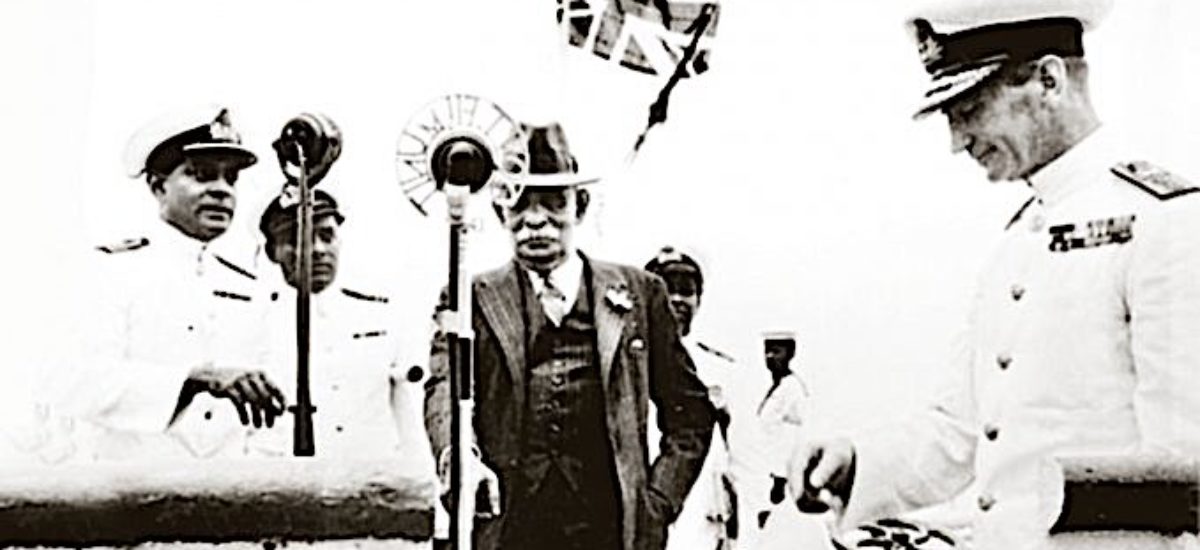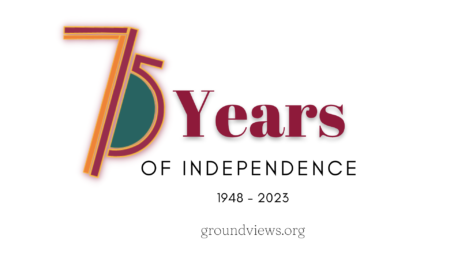Photo courtesy of Roar Media
The first Independence day celebration I could remember as a kid was 1984. I still remember it simply because the celebrations took place in my hometown, Kalutara. It was an extravagant half day event with a full military parade at the Katukurunda racetrack. Older kids from all major schools in and around Kalutara, including my older brother, were told to participate in the event’s marching parade. Rehearsals happened for days, if not for weeks but I do not remember my brother or his friends whining about it. Although the routine activities of the whole town were interrupted, no one complained. No one bothered to question the need for such a grand scale celebration or the amount of public money spent on it. Back then life was simple, people may have even liked these rare interruptions for the lack of any other methods of entertainment. Besides, thanks to the big event, local roads got renovated and the national newspapers were covering Kalutara; both were rare opportunities to come by back then.
Fast forward to 2002 to 2004. I remember reading about some powwows on another unique celebration but this time it wasn’t about independence. In fact, it was quite the opposite. There were some talks at the government level about inviting Portugal to celebrate the 500th year anniversary of their conquest of Sri Lanka. At that time I was already out of the country for higher studies so I had to depend on the internet to find more information, which wasn’t easy. Remember this was two decades ago and digital media was still in its infancy. Based on the media reports, I could sense very minor public resistance to the idea of inviting a former colonial master for such a celebration. If my memory serves me right, that plan was never realized, perhaps due to the change in the government that took place in 2004.
Fast forwarding by another two decades brings us to the present day, the year Sri Lanka marks the 75th anniversary of saying goodbye to its last colonial master. The country is literally bankrupt and has little to no money to pay salaries, conduct elections or import the essentials. But the government is getting ready to celebrate the 75th independence day in an immoderate way. One noticeable difference this time is the public reaction. Unlike the two situations that I explained before, there seems to be a strong public outcry over this untimely and unnecessary spending.
Although the above three stories from the past and the present are seemingly unrelated, I do see one thread relating them to one another. This thread is the role played by President Ranil Wickremesinghe in all of them. When independence day was brought to my hometown in 1984, young Mr. Wickremesinghe was one of the organizers of the event. As the then Minister of Education, he was responsible for herding school children into the marching parade and he was seen in the area quite often. Almost two decades later, when the idea of inviting the Portuguese government to celebrate the 500th anniversary of their conquest of Sri Lanka was put forward, he was the prime minister of the country. Finally, now he is getting ready to celebrate the 75th independence day as the executive president of the country. Interestingly the timeline doesn’t stop here; the man who has been busy celebrating so many independence days in his life is already eyeing for the 100th as well. He said, “We would be able to become a fully developed country by the year 2048, when we celebrate the 100th anniversary of independence,” addressing parliament a few months ago.
I am not sure if this statement made by President Wickremesinghe is hilarious or sarcastic. Perhaps both. For me it is hilarious to see a prominent politician, who has spent almost a half century holding powerful and important political positions in the country, earmarking another 25 years to develop the country. For him, maybe it is sarcastic to see such a population that could be so easily fooled by the political elites for 75 years, and potentially for another 25 years, without much backlash. This statement itself is an example of how the independence day drama has been misused by the political elites/clans of the country for so many years. It has always been used as a convenient year to year distraction to shield from other pressing issues. This time, the president has taken it to the next level by attaching the development goals to the 100th independence day and asking for 25 years in one stretch. Any projections made into the future by our politicians must be assessed with their track records. When the British left in 1948, Sri Lanka was the second strongest economy in Asia and now it is the 30th in a list of fifty some countries. The top economy in Asia (based on per capita GDP) is now Singapore and the 15th is our tiny neighbor, Maldives. Both these island nations used to be British colonies like Sri Lanka and both were freed almost two decades after us. Unlike Sri Lanka, they are much smaller and have no other natural resources except for the ocean around them, which we also have. While they were climbing up the developmental ladder, we opted for the opposite direction. Why? I believe President Wickremesinghe and the political culture he represents has some reasoning to do before setting goals for another 25 years.
Fake nationalism or patriotism aroused through military parades and gun salutes are nice shields to hide behind from the real issues. No one dares question the need for extravagant independence day celebrations when the event is handed to us wrapped in words such as freedom, democracy and sovereignty of the country that many do not understand. At the end of the day the bills are always paid by the taxpayers. Perhaps for the first time, I now hear voices against the unnecessary spending that is being planned in the name of independence. My understanding is that this opposition is mainly made on the grounds of the current hardships and the unfunctional economy. Should this be the only reason to oppose it? Shouldn’t we also look at the meaning of independence? And finally, do we have a compelling reason to celebrate it on February 4?
Although a vast majority of countries have a recognized national day based on some historical reasons, not all of them are named after independence. Independence day is a concept prevalent in countries with a colonial past such as ours. In my opinion, the countries who earned their independence by chasing colonial rulers out through military actions or other serious efforts have a legitimate reason to celebrate their hard earned independence. The US, Algeria and several countries in South America are excellent examples. Many other former colonies were granted independence when the colonizers were tired of maintaining them (or when there was nothing else left to loot). When the British empire realized that it wasn’t economical anymore to have a large empire after the second world war, it decided to walk away from 60 colonies it owned before. Ours happened to be the fifth on that list. When it happened in 1948 even that arrangement was made under dominion condition, meaning the head of state was still the British monarch. This only changed when the country was proclaimed a republic on May 22, 1972. What we celebrate on February 4 is simply the day the British left us willingly and not any earned or real independence. If we are keen to look for a meaningful national day, May 22 is a much better fit.


